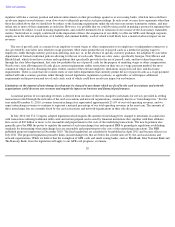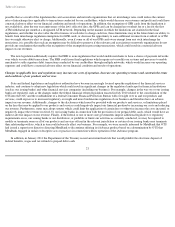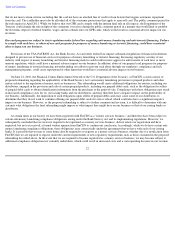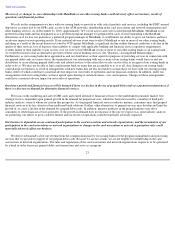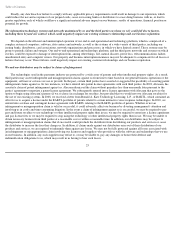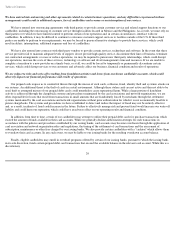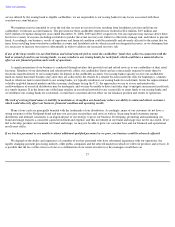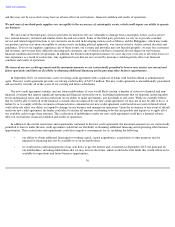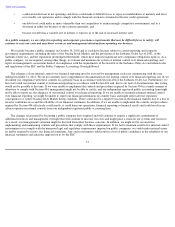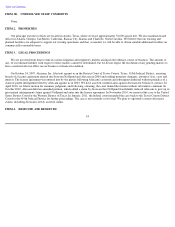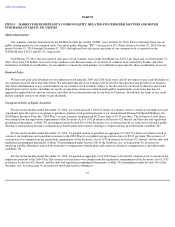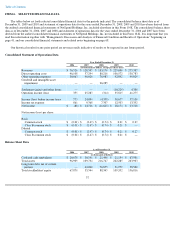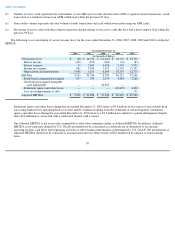NetSpend 2010 Annual Report Download - page 34
Download and view the complete annual report
Please find page 34 of the 2010 NetSpend annual report below. You can navigate through the pages in the report by either clicking on the pages listed below, or by using the keyword search tool below to find specific information within the annual report.
Table of Contents
and they may not be successful or may have an adverse effect on our business, financial condition and results of operations.
We and some of our third-party suppliers are susceptible to the occurrence of catastrophic events, which could impair our ability to operate
our business.
We and some of the third-party services providers on which we rely are vulnerable to damage from catastrophic events, such as power
loss, natural disasters, terrorism and similar events beyond our control. Some of the third-party providers we rely on to provide customer
service and related support functions to our customers are located in developing nations such as Mexico and the Philippines, which may make
our products and services more susceptible to certain events, including political upheavals, war, terrorist attacks, strikes, natural disasters and
pandemics. If we or our suppliers experience any of these events, our systems and networks may not function properly, we may lose customers
and revenues, and we may have difficulty attracting new customers, any of which could have a material adverse impact on our business,
financial condition and results of operations. In addition, the business interruption insurance we carry may not cover any or all of the losses we
may experience as a result of such events. Any significant losses that are not covered by insurance could negatively affect our financial
condition and results of operations.
The terms of our new credit agreement and the maximum amounts we are contractually permitted to borrow may restrict our current and
future operations and limit our flexibility in obtaining additional financing and in pursuing other business opportunities.
In September 2010, we entered into a new revolving credit agreement with a syndicate of banks with SunTrust Bank as administrative
agent. This new credit agreement provides a revolving credit facility of $135.0 million. The new credit agreement is unconditionally guaranteed
and secured by virtually all of the assets of our existing and future subsidiaries.
The new credit agreement contains, and any future indebtedness of ours would likely contain, a number of restrictive financial and non-
financial covenants that impose significant operating and financial restrictions on us, including requirements that we maintain certain liquidity
levels and financial ratios and certain restrictions on our ability to make investments, pay dividends or sell assets. While we currently believe
that we will be able to meet all of the financial covenants that are imposed by our new credit agreement, we may not in fact be able to do so. A
failure by us to comply with the covenants or financial ratios contained in our new credit agreement could result in an event of default which
could adversely affect our ability to respond to changes in our business and manage our operations. Upon the occurrence of any event of default
under our new credit agreement, the lender could elect to declare all amounts outstanding to be due and payable and require us to apply all of
our available cash to repay these amounts. The acceleration of indebtedness under our new credit agreement could have a material adverse
effect on our business, financial condition and results of operations.
In addition to the current restrictions and requirements contained in this new credit agreement, the maximum amounts we are contractually
permitted to borrow under the new credit agreement could limit our flexibility in obtaining additional financing and in pursuing other business
opportunities. These restrictions and requirements could have negative consequences for us, including the following:
• our ability to obtain additional financing for working capital, capital expenditures, acquisitions or other purposes may be
impaired or financing may not be available to us on favorable terms;
• we would need a substantial portion of our cash flows to pay the interest and, at maturity in September 2015, the principal on
our indebtedness, including indebtedness that we may incur in the future, which would reduce the funds that would otherwise be
available for operations and future business opportunities;
30


